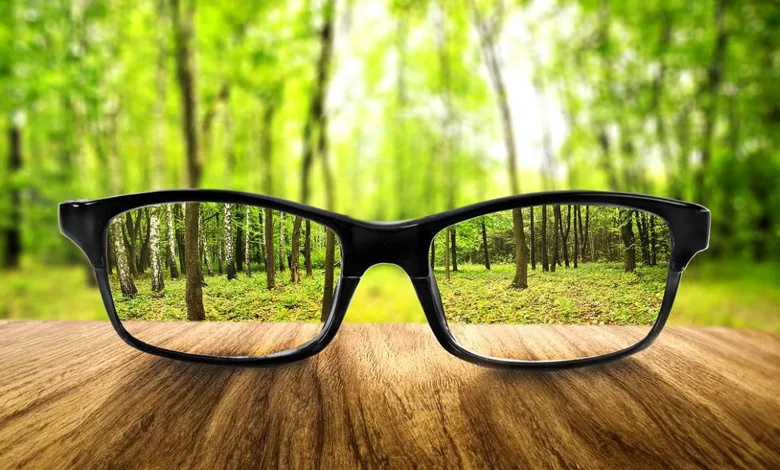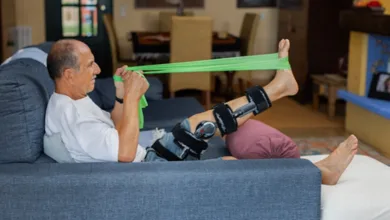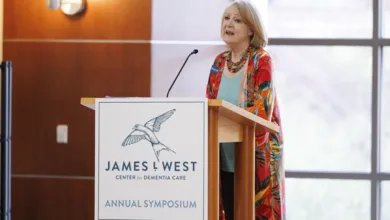Adjusting To Vision Changes in Your 50s And Beyond

You might have woken up one morning, grabbed the newspaper, and couldn’t quite make out the headlines. Or maybe it was that recipe you’d used a million times but suddenly are noticing a blur. Many people in their 50s and beyond notice changes in their vision. It’s a normal part of aging, like wrinkles or gray hair.
Presbyopia, the need for reading glasses, is the most common change. But there are others: cataracts, glaucoma, macular degeneration, and dry eyes. Each brings unique challenges, from blurry vision to difficulty seeing at night. Besides reading, these changes can impact driving, hobbies, and even self-confidence.
The good thing is that you can adapt to these changes. This article shares practical tips and resources to help you adjust your lifestyle, explore new technologies, and, most importantly, maintain a positive outlook.
Understanding The Changes
As you age, the lenses inside your eyes become less flexible. This makes it harder to focus on close objects, a condition called presbyopia. It’s why you might need reading glasses.
But there’s more. Your eyes might become drier or develop cataracts, which cloud the lens. You could also be at risk for glaucoma, a disease that damages the optic nerve, or macular degeneration, which affects central vision. Regular eye exams are your best defense. They can catch these problems early when treatments are most effective. Early detection can even save your sight. Go to your check-ups to be sure you find answers to what is going on with your vision.
Living With Cataracts, Glaucoma, And Macular Degeneration
These conditions sound scary, but treatments exist. Cataracts, cloudy areas in the eye’s lens, often require surgery to replace the lens. It’s a common and safe procedure, especially if you work with an experienced cataract surgeon. Glaucoma, a disease that damages the optic nerve, can often be managed with eye drops. Surgery or laser treatment is sometimes necessary to reduce eye pressure.
Macular degeneration, which affects central vision, has no cure. However, treatments like injections or laser therapy can slow its progression. If you’re living with low vision, don’t despair. Many tools can help you maintain your independence. Consider magnifiers, large-print books, talking watches, and smartphone apps designed for people with vision loss. These tools can make a big difference.

Coping With Presbyopia
You might have presbyopia if you must read a book at arm’s length. It happens to almost everyone as they age. Don’t worry, though, because reading glasses offer a simple solution. They’re functional and also available in various fashionable styles and colors.
But reading glasses aren’t the only option. Bifocals and progressive lenses can correct both near and far vision. They combine multiple prescriptions into a single lens.
Alternatively, you might consider monovision contact lenses, where one lens corrects for distance and the other for close-up vision. Your eye doctor can help determine the best choice for your needs and lifestyle. Remember, presbyopia is simply a natural part of the aging process, and with the right tools, you can continue to see clearly and comfortably.
Lifestyle Adjustments for Better Vision
Minor changes to your daily routine can make a big difference. Make sure your home and workspace have good lighting. Bright light helps you see better and reduces eye strain. Eating a healthy diet also supports eye health. Include foods rich in lutein and zeaxanthin, like leafy greens and eggs. These nutrients protect your eyes from damage.
Omega-3 fatty acids in fish and nuts also benefit your eyes. If you smoke, you may want to quit for the sake of your vision. Smoking increases your risk of cataracts, macular degeneration, and other eye diseases. No matter the age, there is always time to make changes for a healthy lifestyle.
Emotional Well-Being and Vision Loss
Vision changes can be emotional. It’s normal to feel sad, frustrated, or even scared. Acknowledge these feelings. Don’t bottle them up. Talk to friends, family, or a therapist. They can offer support and help you adjust.
Support groups for people with vision loss are also helpful. You can share your experiences, learn coping strategies, and connect with others who understand. Despite vision changes, you can still live a full and independent life. Stay active, pursue your hobbies, and find new ways to connect with others. Don’t let vision loss define you. You’re still you, just with a different perspective.

The Role of Technology
Technology offers many tools to help with vision changes. Your smartphone is good for more than just calls and texts. It can be a powerful assistive device. Many apps offer features like magnification, text-to-speech, and even navigation assistance. These tools can make reading, communicating, and getting around much more accessible.
The future of vision technology is bright. Researchers are developing smart glasses that enhance vision and retinal implants that could restore sight. These technologies are still in their early stages but offer hope for the future. Stay informed about these developments, but remember, they might not be available to everyone or solve every problem.
Conclusion
Remember, vision changes are a natural part of aging. But they don’t have to limit your life. With the correct information and support, you can adapt and thrive.
Take charge of your eye health today. Schedule an eye exam. It’s the most crucial step, even if you think your vision is fine. Don’t hesitate to talk to loved ones about your needs. They can offer a listening ear or a helping hand.
Explore what your community offers. You might be surprised at the resources available, from transportation services to technology training. And don’t give up on the things you love. You can continue to enjoy your hobbies and passions with a few adjustments.





